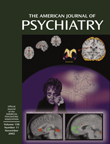Abstract
OBJECTIVE: The study examined a large data set to determine whether patients’ sex affected the outcome of antidepressant treatment. METHOD: Data for 1,746 patients aged 18–65 years who had been treated with tricyclic antidepressants, monoamine oxidase inhibitors (MAOIs), fluoxetine, or placebo were examined in a retrospective analysis to determine whether men and women differed in their responses to antidepressants. To examine the effect of menopausal status in the absence of data on individual patients’ menopausal status, results for female patients younger or older than age 50, 52, 54, and 56 were compared. RESULTS: Men and women both younger and older than age 50 had equivalent response rates to tricyclics and fluoxetine. Women had a statistically superior response to MAOIs. Placebo response was equivalent across all groups. CONCLUSIONS: Neither sex nor menopausal status may be relevant in antidepressant treatment of adult depressed patients up to 65 years of age. Although women had a statistically superior response to MAOIs, this difference may not be clinically relevant.



